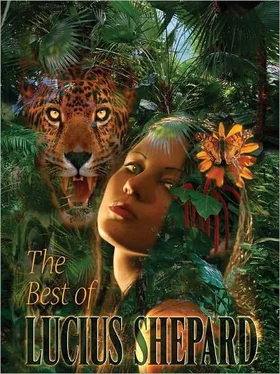Orlando was typical of the citizenry in his attitude of divine right concerning the land, in his arrogance toward the poor (“They are eternal,” he once said. “You’ll sooner find a cure for death than for poverty.”) and in his single-minded pursuit of pleasure; yet there was about him a courage and soulfulness that gained the arcevoalo’s respect. On most nights he and Orlando would dress in black trousers and blousy silk shirts, and would join similarly dressed young men by the fountain in the main square. There they would practice at dueling with the knife and the cintral (a jungle weed with sharp-edged tendrils and a rudimentary nervous system that could be employed as a living cat-o’-nine-tails), while the young women would promenade around them and cast shy glances at their favorites. The arcevoalo pretended clumsiness with the weapons, not wanting to display his speed and strength, and he was therefore often the subject of ridicule. This was just as well, for occasionally these play-duels would escalate, and then—since even death was beautiful in Sangue do Lume—blood would eel across the cobblestones, assuming lovely serpentine forms, and the palms ringing the square would rustle their fronds, and sad music would issue from the fountain, mingling with the splash of the waters.
Many of these duels stemmed from disputes over the affections of the governor’s daughter, Sylvana, the sole child of his dead wife, his pride and joy. The bond between father and daughter was of such intimacy, it was said that should one’s heart stop, the other would not long survive. Sylvana was pale, slim, blonde, and angelic of countenance, but was afflicted by a brittleness of expression that bespoke coldness and insensitivity. Observing this, the arcevoalo was led to ask Orlando why the young men would risk themselves for so heartless a prize. Orlando laughed and said, “How can you understand when you have no experience of women?” And he invited the arcevoalo to gain this experience by coming with him to the Favelin, which was the name of the slum surrounding the city.
The next night, Orlando and the arcevoalo entered the cluttered, smelly streets of the Favelin. The hovels there were made of rotting boards, pitched like wreckage at every angle; and were populated by a malnourished, shrunken folk who looked to be of a different species from Orlando. Twists of oily smoke fumed from the chimneys; feathered lizards slept in the dirt next to grimy children; hags in black shawls sacrificed pigs beneath glass bells full of luminescent fungus and scrawled bloody words in the dust to cure the sick. How ugly all this might have been beyond the range of the city’s machines, the arcevoalo could not conceive. They came to a street whereon the doors were hung with red curtains, and Orlando ushered him through one of these and into a room furnished with a pallet and a chair. Mounted on the wall was the holograph of a bearded man who—though the cross to which he was nailed had burst into emerald flames—had maintained a beatific expression. The flames shed a ghastly light over a skinny girl lying on a pallet. She was hollowcheeked, with large, empty-looking eyes and jaundiced skin and ragged dark hair. Orlando whispered to her, gave her a coin, and—grinning as he prepared to leave—said, “Her name is Ana.”
Without altering her glum expression, Ana stood and removed her shift. Her breasts had the convexity of upturned saucers, her ribs showed, and her genitals were almost hairless. Nevertheless, the arcevoalo became aroused, and when he sank down onto the pallet and entered her, he felt a rush of dominance and joy that roared through him like a whirlwind. He clutched at Ana’s hips with all his strength, building toward completion. And staring into her hopeless eyes, he sensed the profound alienness of women, their mystical endurance, the eerie valences of their moods, and how even their common thoughts turn hidden corners into bizarre mental worlds. Knowing his dominance over this peculiar segment of humanity acted to heighten his desire, and with a hoarse cry he fell spent beside Ana and into a deep sleep.
He awoke to find her gazing at him with a look of such rapt contemplation that when she turned her eyes away, the image of his face remained reflected in her pupils. Timorously, shyly, she asked if he planned to return to the Favelin, to her. He recalled then the force with which he had clutched her, and he inspected the tips of his fingers. Droplets glistened beneath the nails, and there were damp bruises on Ana’s hips. He realized that his touch, his secret chemistry, had manifested as love, an emotion whose power he apprehended but whose nature he did not understand.
“Will you return?” she asked again.
“Yes,” he said, feeling pity for her. “Tomorrow.”
And he did return, many times, for in his loveless domination of that wretched girl he had taken a step closer to adopting the ways of man. He had come to see that there was little difference between the city and the jungle, that “civilization” was merely a name given to comfort, and that the process of life in Sangue do Lume obeyed the same uncivilized laws as did the excesses of the sortilene. What point was there in warring against man? And, in any case, how could he win such a war? His touch was a useless power against an enemy who could summon countless allies from its worlds behind the sky.
Over the ensuing weeks the arcevoalo grew ever more despondent, and in the throes of despondency the human elements of his soul grew more and more predominant. At dusk his reverie was troubled by images of lust and conquest stirred from the memories of Joao Merin Nascimento. And his work aboard Orlando’s ship became so proficient that Caudez do Tuscanduva held a fete in his honor, a night of delirium and pleasure during which a constellation of his profile appeared in the sky, and the swaying of the palms was choreographed by artificial winds, and the machines -within the -walls were turned high, beautifying everyone to such an extent that everyone’s heart was broken…broken, and then healed by the consumption of tiny, soft-boned animals that induced a narcissistic ecstasy when eaten alive. Despite his revulsion for this practice, the arcevoalo indulged in it, and, his teeth stained with blood, he spent the remainder of the night wandering the incomparably beautiful streets and gazing longingly at himself in mirrors.
Thereafter Caudez do Tuscanduva took Orlando and the arcevoalo under his wing, telling them they were to be his protégés, that he had great plans for them. Further, he urged them to pay court to Sylvana, saying that, yes, she was an icy sort, but the right man would be able to thaw her. In this Orlando needed no urging. He plied her with gifts and composed lyrics to her charms. But Sylvana was disdainful of his efforts, and though for the most part she was equally disdainful of the arcevoalo, now and then she would favor him with a chilly smile, which—while scarcely encouraging—made Orlando quite jealous.
“You’d do better to set your sights elsewhere,” the arcevoalo once told Orlando. “Even if you win her, you’ll regret it. She’s the kind of woman who uses marriage like a vise, and before you know it she’ll have you squealing like a stuck pig.” He had no idea whether or not this was true—it was something he had overheard another disappointed suitor say—but it accorded with his own impressions of her. He believed that Orlando was leaving himself open to the possibility of grievous hurt, and he told him as much. No matter how forcefully he argued, though, Orlando refused to listen.
“I know you’re only trying to protect me, friend,” he said. “And perhaps you’re right. But this is an affair of the heart, and the heart is ruled by its own counsel.”
And so the arcevoalo could do nothing more than to step aside and let Orlando have a clear field with Sylvana.
Читать дальше






